
Gaius Julius Caesar Augustus, also known as Octavian, was the founder of the Roman Empire. He reigned as the first Roman emperor from 27 BC until his death in AD 14. The reign of Augustus initiated an imperial cult, as well as an era of imperial peace in which the Roman world was largely free of armed conflict. The Principate system of government was established during his reign and lasted until the Crisis of the Third Century.

Tiberius Claudius Caesar Augustus Germanicus was a Roman emperor, ruling from AD 41 to 54. A member of the Julio-Claudian dynasty, Claudius was born to Drusus and Antonia Minor at Lugdunum in Roman Gaul, where his father was stationed as a military legate. He was the first Roman emperor to be born outside Italy.

Gaius Caesar Augustus Germanicus, better known by his nickname Caligula, was Roman emperor from AD 37 until his assassination in AD 41. He was the son of the Roman general Germanicus and Augustus' granddaughter Agrippina the Elder, members of the first ruling family of the Roman Empire. He was born two years before Tiberius was made emperor. Gaius accompanied his father, mother and siblings on campaign in Germania, at little more than four or five years old. He had been named after Gaius Julius Caesar, but his father's soldiers affectionately nicknamed him "Caligula".
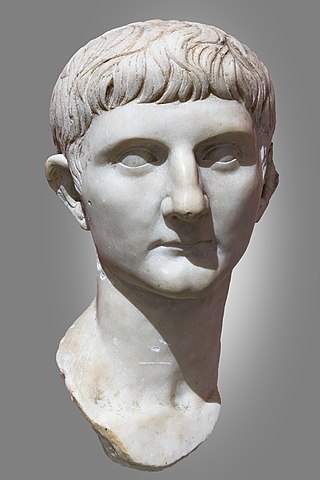
Germanicus Julius Caesar was an ancient Roman general and politician most famously known for his campaigns in Germania. The son of Nero Claudius Drusus and Antonia the Younger, Germanicus was born into an influential branch of the patrician gens Claudia. The agnomen Germanicus was added to his full name in 9 BC when it was posthumously awarded to his father in honor of his victories in Germania. In AD 4 he was adopted by his paternal uncle Tiberius, himself the stepson and heir of Germanicus' great-uncle Augustus; ten years later, Tiberius succeeded Augustus as Roman emperor. As a result of his adoption, Germanicus became an official member of the gens Julia, another prominent family, to which he was related on his mother's side. His connection to the Julii Caesares was further consolidated through a marriage between him and Agrippina the Elder, a granddaughter of Augustus. He was also the father of Caligula, the maternal grandfather of Nero, and the older brother of Claudius.
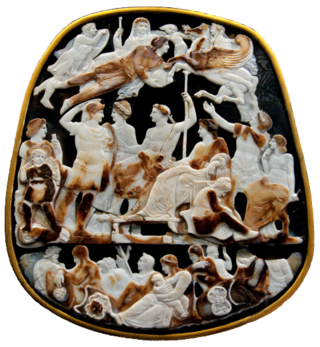
The Julio-Claudian dynasty comprised the first five Roman emperors: Augustus, Tiberius, Caligula, Claudius, and Nero.

Tiberius Julius Caesar Augustus was Roman emperor from AD 14 until 37. He succeeded his stepfather Augustus, the first Roman emperor. Tiberius was born in Rome in 42 BC to Roman politician Tiberius Claudius Nero and his wife, Livia Drusilla. In 38 BC, Tiberius' mother divorced his father and married Augustus. Following the untimely deaths of Augustus' two grandsons and adopted heirs, Gaius and Lucius Caesar, Tiberius was designated Augustus' successor. Prior to this, Tiberius had proved himself an able diplomat, and one of the most successful Roman generals: his conquests of Pannonia, Dalmatia, Raetia, and (temporarily) parts of Germania laid the foundations for the empire's northern frontier.
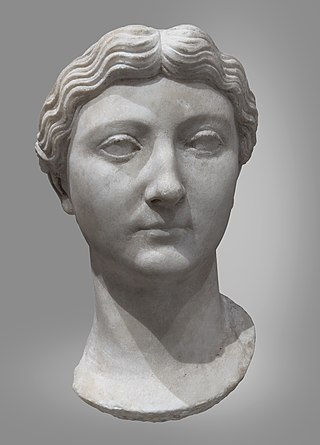
Livia Drusilla was Roman empress from 27 BC to AD 14 as the wife of emperor Augustus. She was known as Julia Augusta after her formal adoption into the Julian family in AD 14.

I, Claudius is a historical novel by English writer Robert Graves, published in 1934. Written in the form of an autobiography of the Roman Emperor Claudius, it tells the history of the Julio-Claudian dynasty and the early years of the Roman Empire, from Julius Caesar's assassination in 44 BC to Caligula's assassination in AD 41. Though the narrative is largely fictionalized, most of the events depicted are drawn from historical accounts of the same time period by the Roman historians Suetonius and Tacitus.

Gaius Caesar was a grandson and heir to the throne of Roman emperor Augustus, alongside his younger brother Lucius Caesar. Although he was born to Marcus Vipsanius Agrippa and Julia, Augustus' only daughter, Gaius and Lucius were raised by their grandfather as his adopted sons and joint-heirs. He experienced an accelerated political career befitting a member of the Julio-Claudian dynasty, with the Roman Senate allowing him to advance his career without first holding a quaestorship or praetorship, offices that ordinary senators were required to hold as part of the cursus honorum.

Drusus Julius Caesar, also called Drusus the Younger, was the son of Emperor Tiberius, and heir to the Roman Empire following the death of his adoptive brother Germanicus in AD 19.

Lucius Caesar was a grandson of Augustus, the first Roman emperor. The son of Marcus Vipsanius Agrippa and Julia the Elder, Augustus' only daughter, Lucius was adopted by his grandfather along with his older brother, Gaius Caesar. As the emperor's adopted sons and joint-heirs to the Roman Empire, Lucius and Gaius had promising political and military careers. However, Lucius died of a sudden illness on 20 August 2 AD, in Massilia, Gaul, while traveling to meet the Roman army in Hispania. His brother Gaius also died at a relatively young age on 21 February 4 AD. The untimely loss of both heirs compelled Augustus to redraw the line of succession by adopting Lucius' younger brother, Agrippa Postumus as well as his stepson, Tiberius on 26 June 4 AD.

Scribonia was the second wife of Octavian, later the Roman Emperor Augustus, and the mother of his only biological child, Julia the Elder. Through her youngest daughter she was the mother-in-law of the Emperor Tiberius, great-grandmother of the Emperor Caligula and Empress Agrippina the Younger, and great-great-grandmother of the Emperor Nero.
Iullus Antonius was a Roman magnate and poet. A son of Mark Antony and Fulvia, he was spared by the emperor Augustus after the civil wars of the Republic, and was married to the emperor's niece. He was later condemned as one of the lovers of Augustus's daughter, Julia, and killed himself.
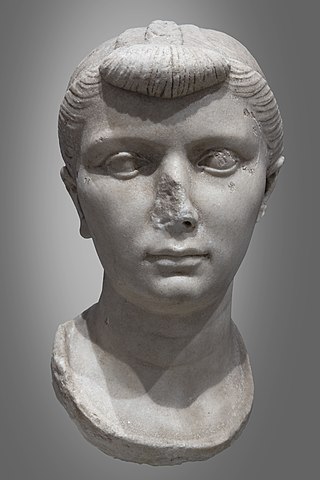
Julia the Elder, known to her contemporaries as Julia Caesaris filia or Julia Augusti filia, was the daughter and only biological child of Augustus, the first Roman emperor, and his second wife, Scribonia. Julia was also stepsister and second wife of the Emperor Tiberius; maternal grandmother of the Emperor Caligula and the Empress Agrippina the Younger; grandmother-in-law of the Emperor Claudius; and maternal great-grandmother of the Emperor Nero. Her epithet "the Elder" distinguishes her from her daughter, Julia the Younger.

Marcus Claudius Marcellus was the eldest son of Gaius Claudius Marcellus and Octavia Minor, sister of Augustus. He was Augustus' nephew and closest male relative, and began to enjoy an accelerated political career as a result. He was educated with his cousin Tiberius and traveled with him to Hispania where they served under Augustus in the Cantabrian Wars. In 25 BC he returned to Rome where he married his cousin Julia, who was the emperor's daughter. Marcellus and Augustus' general Marcus Vipsanius Agrippa were the two popular choices as heir to the empire. According to Suetonius, this put Agrippa at odds with Marcellus, and is the reason why Agrippa traveled away from Rome to Mytilene in 23 BC.
Allan Johnstone Massie is a Scottish journalist, columnist, sports writer and novelist. He is a Fellow of the Royal Society of Literature. He has lived in the Scottish Borders for the last 25 years, and now lives in Selkirk.

De vita Caesarum, commonly known as The Twelve Caesars, is a set of twelve biographies of Julius Caesar and the first 11 emperors of the Roman Empire written by Gaius Suetonius Tranquillus. The group are: Julius Caesar, Augustus, Tiberius, Caligula, Claudius, Nero, Galba, Otho, Vitellius, Vespasian, Titus, Domitian.
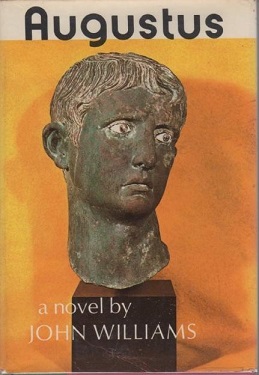
Augustus is an epistolary, historical fiction by John Williams published by Viking Press in 1972. It tells the story of Augustus, emperor of Rome, from his youth through old age. The book is divided into two parts, the beginning chronicling his rise to power, the latter describing his rule thereafter, and the familial problems faced choosing a successor. Williams and Augustus shared the 1973 U.S. National Book Award for Fiction with John Barth and Chimera, the first time the award was split, and the only one of Williams's four novels to receive significant acclaim within his lifetime.
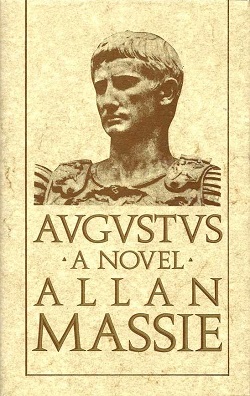
Augustus is a 1986 historical novel by Scottish writer Allan Massie, the first of a highly regarded series of novels about the movers and makers of Imperial Rome. Massie begins with Augustus, the successor to Julius Caesar, who ruled the Roman Empire for forty one years and oversaw the beginnings of an extended peace, the Pax Romana.

















